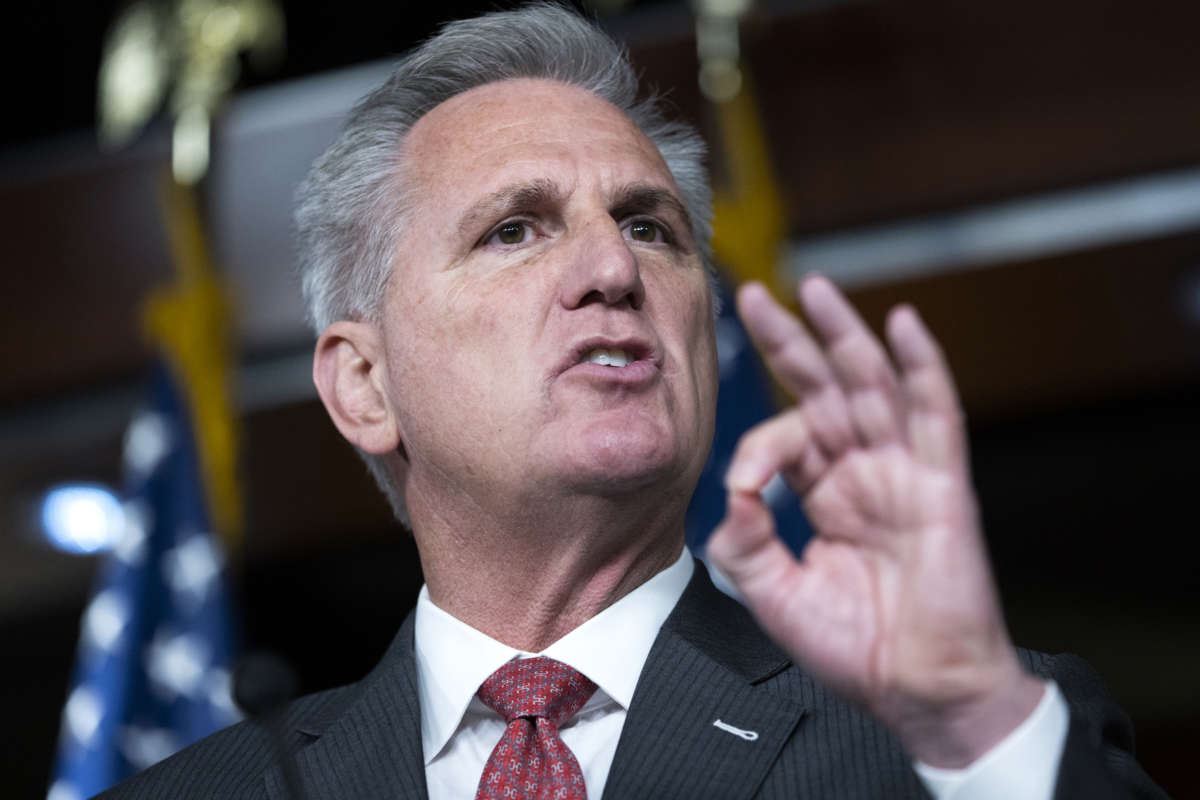Did you know that Truthout is a nonprofit and independently funded by readers like you? If you value what we do, please support our work with a donation.
Minority Leader Kevin McCarthy (R-California) went on an eight-and-a-half hour long tirade starting on Thursday night and ending early Friday morning during his allotted “magic minute” on the House floor on Thursday.
The speech, which began at roughly 8:30 pm ET on Thursday, resembled a filibuster and appeared to be a tactic to delay a vote on the Democrats’ social spending reconciliation bill, which passed the chamber Friday morning. It is the longest recorded speech in the House, breaking a previous record set by House Speaker Nancy Pelosi (D-California).
Although McCarthy occasionally touched on the bill itself, his speech also included completely and bizarrely unrelated tangents, including one about his friendship with Elon Musk and his inability to afford a Tesla. Some have speculated that the speech served more than one purpose, saying that it not only delayed the bill, but also served as McCarthy’s audition to take over as House speaker in the event that Republicans take back control of the chamber.
McCarthy finally finished his “magic minute,” which allows party leaders in the House to speak for as long as they like, at about 5:00 am, with Republican colleagues nodding off behind him. At that point, he yielded his time back to Pelosi, who had left hours ago.
The bill that he was filibustering contains provisions like paid family and medical leave, universal pre-K, Medicare expansion and a plan to lower the cost of certain prescription drugs. It passed 220 to 213 after the chamber reconvened at 8 am, and now goes to the Senate, where it will likely be revised.
Reporters who witnessed much of the speech described it as circular and repetitive, and nearly incoherent in theme.
McCarthy parroted oft-repeated Republican grievances that have taken over the party in recent weeks, like spurious concerns about inflation, which economists have said won’t be worsened by the Build Back Better Act. He repeatedly brought up China, a popular talking point among Republicans, and at one point suggested that the Chinese government wouldn’t bolster the Internal Revenue Service (IRS) as the reconciliation bill proposes, using this talking point to paint the bill as extremist.
He straight out lied about the reconciliation bill, saying at one point that it would cost $5 trillion — far higher than the bill was going to cost even when it was planned to be a $3.5 trillion bill spread out over ten years. Democrats heckled him in response, yelling out increasingly large numbers to mock the GOP leader.
By at least 11 pm, the speech was essentially a stream of consciousness, as reporter Aaron Rupar noted. “Gas prices! Thanksgiving!” the GOP leader exclaimed about two and a half hours into his speech. During his rant about the fully paid-for bill, he touched on World War II and Hitler. His speech also contained countless non-sequiturs — “I can’t even afford to test drive a Tesla,” he said around 11, “and Elon is one of my best friends.”
He pondered what the country would be like if Abraham Lincoln hadn’t been assassinated, said that he would love to debate Jim Crow, and said that he wished he had attended the Tiananmen Square massacre. Close to midnight, he mentioned January 6 as the day he got his second COVID shot.
At around 1 am, McCarthy reportedly asked, “Does the McDonald’s still have the dollar meal?” Later, after many reporters and fellow members of Congress had left, he informed the chamber of “the secret” behind baby carrots, which is that they’re large carrots that are carved down to shape. That was around 3 am; after that, he went on to talk for two more hours.
The speech was largely mocked by Democrats and progressives, who joked about its absurd length. Rep. Jamie Raskin (D-Maryland) in particular made several jokes at McCarthy’s expense, calling his tirade an “unhinged diatribe.” At 11:30 pm, when many of the Republicans behind McCarthy had fallen asleep, Raskin quipped, “We are hearing rumors that the front row of GOP hostages behind Kevin McCarthy are asking whether they can just be censured instead.”
Trump is silencing political dissent. We appeal for your support.
Progressive nonprofits are the latest target caught in Trump’s crosshairs. With the aim of eliminating political opposition, Trump and his sycophants are working to curb government funding, constrain private foundations, and even cut tax-exempt status from organizations he dislikes.
We’re concerned, because Truthout is not immune to such bad-faith attacks.
We can only resist Trump’s attacks by cultivating a strong base of support. The right-wing mediasphere is funded comfortably by billionaire owners and venture capitalist philanthropists. At Truthout, we have you.
Our fundraising campaign is over, but we fell a bit short and still need your help. Please take a meaningful action in the fight against authoritarianism: make a one-time or monthly donation to Truthout. If you have the means, please dig deep.
